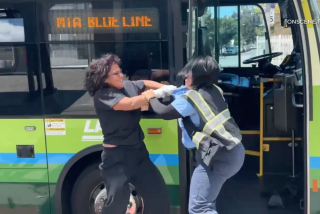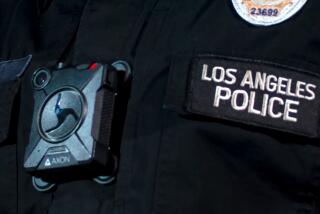RTD’s Dyer Asks Tougher Drug Rules
- Share via
In the face of public pressure that followed a rash of bus accidents, general manager John Dyer is recommending tougher anti-drug rules for employees of his Southern California Rapid Transit District--while backing away from full-scale mandatory testing.
Dyer’s recommendations, contained in a two-part report released Monday, will be made formally to the RTD board of directors at a meeting Thursday. Instead of mandatory random testing, Dyer instead will suggest that the board continue its testing based on cause, or “incident,” for another six months.
Dyer is recommending some rules to toughen the current testing system, “but the question is whether it will be enough for the board,” said one RTD official. The board, whose members are appointed, usually relies heavily on the recommendation of Dyer, but “there’s a lot of heat from the supervisors and the press and others to do something extreme,” said Earl Clark, general chairman of the United Transportation Union, which represents 5,000 bus drivers.
However, RTD board member Gordana Swanson said Monday she believes “the board will probably go along with the general manager’s recommendations--for now.”
Nearly two weeks ago the board, under heavy pressure to respond to a wave of recent bus accidents--some of them linked to driver drug use--ordered Dyer to consider mandatory testing of the district’s 8,941 employees. Three drivers have been fired, one of whom was later reinstated, after tests after accidents revealed the drivers were under the influence of drugs.
The incidents linking RTD drivers and drug abuse in the public mind began with a May 12 accident downtown in which 23 passengers were injured. The driver in that accident, Vivian Lee Harris, afterward tested positive for cocaine and was dismissed.
A rookie bus driver, Shirley Riojas, was fired after a July 31 accident in which an RTD bus flipped over on the Hollywood Freeway, injuring her and 25 others. Riojas has disputed allegations by unnamed RTD officials that she tested positive for illegal drugs.
More Inclusive Policy Sought
In his report, Dyer agreed with Clark and other union officials who said that mandatory random testing “. . .could violate the (search and seizure provisions of the) Fourth Amendment to the United States Constitution.” Clark said that if mandatory testing is implemented, “I can assure you we’ll be in court.”
Dyer is pushing what he called a more comprehensive form of the current drug testing policy. As it is now, generally RTD employees are tested for drugs before they are hired, once every two years, and after accidents or strange behavior, said RTD spokesman Marc Littman. Dyer’s proposal amends the current policy so that the option for drug testing would “kick in” more often.
For example, excessive driver absenteeism, another problem revealed by an audit of the RTD this summer, would become a cause for drug testing, as would a high incidence of tardiness. Also, more accidents involving vehicle damage than are now the rule would prompt the administering of a test to drivers.
In addition, supervisors would have more discretion to order drug tests. If an employee displayed a pattern of absenteeism on the day after payday or after his days off, for example, that employee could be directed to take a test.
More to Read
Sign up for Essential California
The most important California stories and recommendations in your inbox every morning.
You may occasionally receive promotional content from the Los Angeles Times.













